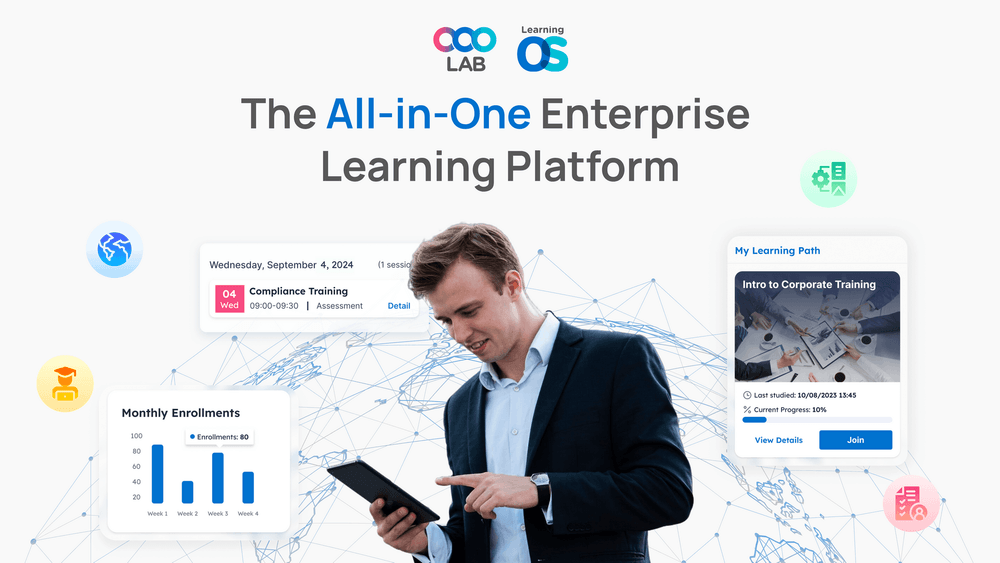

The sales landscape is evolving at an unprecedented pace, driven by technological advancements, shifting buyer behaviors, and the demand for personalized customer experiences. Sales training and enablement are critical to equipping sales teams with the skills, tools, and knowledge needed to thrive in this dynamic environment. As we look toward 2025, emerging trends are reshaping how organizations approach sales training, with enterprise LMS (Learning Management System) platforms playing a pivotal role in delivering scalable, engaging learning experiences.
This blog explores the future of sales training and enablement, highlighting key trends to watch in 2025. From AI-driven personalization to immersive technologies, we’ll dive into how these innovations, supported by enterprise LMS, are transforming sales performance, backed by data and actionable insights.

Sales training equips reps with the skills to close deals, while enablement provides the tools, content, and insights to maximize performance. Together, they empower sales teams to meet modern buyer expectations, such as personalized solutions and seamless digital interactions. A 2024 Gartner report predicts that by 2026, 65% of B2B sales organizations will rely on technology-driven training to stay competitive.
The rise of enterprise LMS platforms has revolutionized sales training by offering centralized, scalable solutions for delivering content, tracking progress, and measuring impact. As we head into 2025, new trends are set to further transform how organizations train and enable their salesforces, ensuring they remain agile and effective.
>>> Read more: Effective Onboarding Strategies for New Sales Hires: Setting Them Up for Success
The future of sales training is bright, with several trends poised to redefine how sales teams learn and perform. Below, we explore the most impactful developments for 2025.
Artificial intelligence is revolutionizing sales training by tailoring content to individual needs. An enterprise LMS uses AI to analyze a rep’s performance, role, and skill gaps, recommending customized modules—such as objection handling for junior reps or strategic selling for veterans. A 2024 McKinsey study found that personalized learning boosts engagement by 67% and skill retention by 56%.
In 2025, AI will also predict training needs based on market trends or customer data, ensuring reps stay ahead. For example, an enterprise LMS might suggest sales training on new product features before a launch, enhancing preparedness.
Busy sales reps can’t afford lengthy training sessions. Microlearning—short, focused modules of 5-10 minutes—delivers sales training in bite-sized chunks, perfect for on-the-go learning. An enterprise LMS supports microlearning with videos, quizzes, or simulations, covering topics like closing techniques or CRM usage.
Virtual reality (VR) and augmented reality (AR) are transforming sales training by creating realistic, interactive scenarios. Reps can practice pitches in a virtual boardroom or simulate client negotiations, building confidence and skills. An enterprise LMS integrates VR/AR modules, making immersive training accessible to global teams.
In 2025, VR/AR adoption will grow, with a 2024 Deloitte report predicting 70% of organizations will experiment with immersive learning by 2026. For sales training, this means more engaging, hands-on practice without real-world risks.
Gamification—using badges, leaderboards, and rewards—makes sales training fun and competitive. An enterprise LMS can host gamified challenges, like virtual deal-closing contests, motivating reps to participate.
In 2025, gamification will evolve with AI-driven leaderboards that adapt to individual performance, ensuring fair competition. Sales teams might earn points for completing sales training modules, fostering a culture of continuous learning.
Analytics are at the heart of modern sales training. An enterprise LMS provides real-time insights into completion rates, quiz scores, and skill gaps, allowing managers to refine programs. For example, if analytics show low engagement in sales training, trainers can add interactive elements.
In 2025, predictive analytics will take center stage, forecasting which skills reps need based on market shifts. This ensures sales training aligns with emerging demands, such as selling AI-driven solutions.
Sales reps learn best when they share knowledge. An enterprise LMS supports social learning through forums, peer reviews, and group challenges, fostering collaboration. For instance, reps can share sales training tips on closing complex deals, creating a knowledge-sharing culture.
In 2025, social learning will integrate with AI chatbots that facilitate discussions or recommend peer connections. This enhances team cohesion, especially for hybrid salesforces.
Seamless integration with CRM platforms (e.g., Salesforce) and collaboration tools (e.g., Slack) is critical for enablement. An enterprise LMS embedded in daily workflows delivers sales training without disrupting productivity. For example, a rep might receive a training prompt in Salesforce before a client call.
In 2025, expect deeper integrations, with LMS platforms pulling real-time CRM data to tailor sales training to specific deals or clients.
While technical skills are vital, soft skills like empathy and communication are increasingly important. Buyers value reps who understand their needs, making emotional intelligence (EQ) a priority for sales training. An enterprise LMS can deliver EQ-focused modules, such as role-playing scenarios to practice active listening.
In 2025, sales training will emphasize blending EQ with data-driven selling, creating well-rounded reps who excel in relationship-building.
Book Free Demo with us. Bring your Training and Learning to a new height with LearningOS.

>>> Read more: Building Confidence in Your Sales Team Through Training and Development
>>> Read more: Addressing declining retail foot traffic issue
The future of sales training and enablement in 2025 is dynamic, driven by AI, immersive technologies, and data-driven insights. These trends empower sales teams to meet modern buyer demands while staying agile in a fast-changing world.
By embracing these trends—personalization, microlearning, VR, and more—organizations can build high-performing sales teams ready for the challenges of tomorrow. Start preparing now to ensure your sales training strategy leads the way in 2025.
>>> Read more: A guide to teaching sales rep positive response
>>> Read more: Why is employee upskilling non-negotiable for business success
At OOOLAB (pronounced 'uːlæb'), our mission is to make complex learning operations simple. We aim to positively impact the lives of over 1,000,000 learners and educators by the end of 2026.
OOOLAB's LearningOS provides educational institutions and corporate enterprises with an all-in-one solution to create and deliver engaging learning experiences.
We meet organizations' needs or support your growth. We provide undivided attention. We provide:
1. Dedicated success manager: We offer direct communication with a real human who'll discuss your enterprises unique learning operations and goals.
2. Personalized setup: Our team will help you transition to LearningOS on your schedule, one step at a time.
3. Around the clock support: Get help from us any time, and in any time zone.
We have recently launched a new AI training tool, Skill Quotient OS, designed to elevate hybrid training to new heights. It offers role-play exercises with scenarios and assessments.This tool can apply in sales training, corporate development and customer support training in any industry.
Reach out to us at: LinkedIn, Facebook, Instagram, Tiktok, X
1. What are the main benefits of LearningOS
Our platform is easy to use and automates all aspects of your learning operations. It efficiently manages complex tasks, allowing you to concentrate on delivering exceptional learning experiences.
2. What main features does LearningOS offer?
Our all-in-one software solution combines a Content Management System, a Learning Management System, content authoring tools, and a mobile friendly Learner Portal.
3. Can your platform be used for corporate enterprises?
Absolutely! LearningOS is an Enterprise LMS that is a great fit for corporate learning. In fact, we have clients with up to 700,000 employees using LearningOS! Upskill your workforce by creating and assigning interactive eLearning content while effortlessly tracking employee progress.
4. Who currently uses your platform?
Our platform is currently used by over 120,000+ learners, parents, and employees across 21 countries worldwide!
5. What types of content options are available on your platform?
We offer ready-to-go curriculums for various educational purposes or our expert design team can build a custom course for you. We can also upload your existing learning materials and enhance them digitally.
6. What is unique about LearningOS?
Our platform, designed by educators for educators, provides you with all the tools you need to scale. Build and promote your own hybrid and blended learning courses and save money on licensing fees by owning your own proprietary content.
7. How can I get started?
Schedule a meeting with our experts and we’ll talk about how our platform can address your unique challenges and help to grow your business.